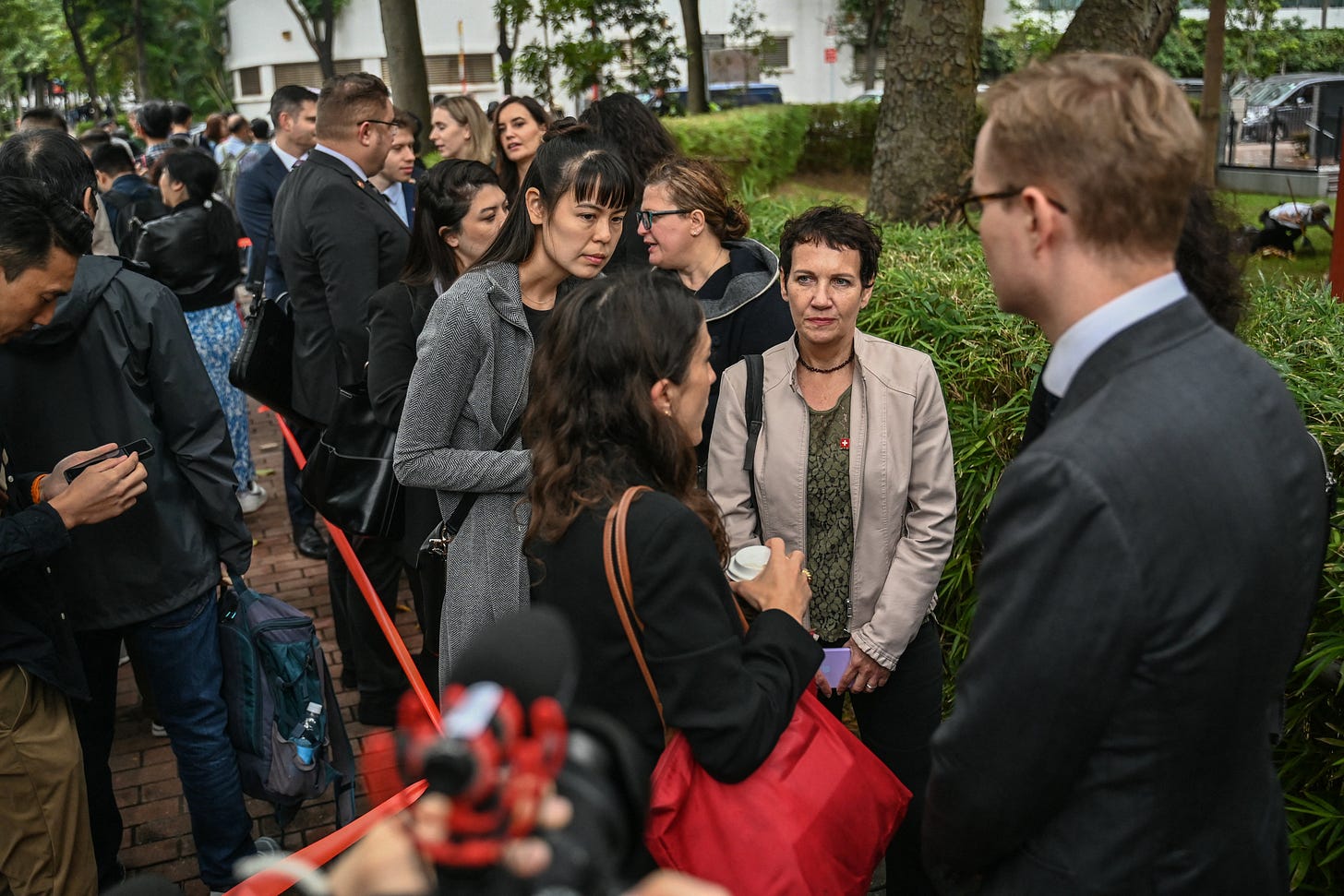My latest column: Unless Hong Kong has clearer parameters regarding what it can and cannot do under the two systems, tensions and misconceptions will prevent the city from moving forward.
Republished from today's SCMP: https://www.scmp.com/opinion/hong-kong-opinion/article/3288611/tension-between-socialism-capitalism-holds-back-hong-kongs-recovery?module=top_story&pgtype=section.
On November 19, two major events unfolded simultaneously in Hong Kong which highlighted the paradox of this once-great but now-confused city as it tries to navigate between socialism and capitalism in an era of great uncertainty.
On Hong Kong Island, the Monetary Authority hosted about 300 global and regional financial leaders, including top executives from Goldman Sachs, Morgan Stanley and JP Morgan. Some of China’s top financial officials, including Vice-Premier He Lifeng, flew in for the event, where they promised full support for the city at a time when its future as a global financial hub is under scrutiny.
However, the effort to use this three-day marquee event to burnish the city’s image was overshadowed by another major event taking place across Victoria Harbour. International journalists and foreign diplomats flocked to the West Kowloon Magistrates’ Courts, where 45 former lawmakers and activists were sentenced to from four to 10 years in prison in Hong Kong’s biggest national security trial following the imposition of the national security law after the large-scale protests in 2019.
It remains unclear whether the timing of these two major events was coincidental or deliberate. However, subsequent international media reports have shown that the convictions dominated the headlines, not only eclipsing the forum but also making some of the international financiers attending uncomfortable. They were concerned about responding to possible criticism at home for being in Hong Kong to praise the city’s and China’s growth prospects while international media reports on the convictions portrayed the city in a very negative light.
Following the imposition of the national security law in June 2020 and the return of political stability, Hong Kong officials have taken every opportunity to trumpet the city’s comeback. However, international perceptions of Hong Kong have worsened. As one seasoned international analyst recently told me, any news about the city is likely to be about someone on trial or being convicted for their role in the violent 2019 protests.
Meanwhile, Hong Kong officials and elites have failed in their efforts to counter these misconceptions about the city. In fact, some have inadvertently contributed to the perception that Hong Kong is fast becoming one country, one system as they are eager to adopt mainland-style language and tone in their public statements, as well as adopting some mainland-style bureaucratic practices.
In the past four years, both Hong Kong and mainland Chinese officials have repeatedly stressed the need to uphold national security and warned of national security threats “lurking” in society. This is despite the fact that the city’s political situation became stable soon after the imposition of the national security law in 2020.
Tentative signs have emerged that Chinese officials are finally relieved, given the high-profile trials and convictions in the past few months. Zheng Yanxiong, head of the central government’s liaison office in Hong Kong, described the city in a public speech on November 25 as finally “becoming China’s Hong Kong”.
But internationally, the policy of “one country, two systems” and Hong Kong’s role as a global financial hub are facing further scrutiny. Now it is high time for Beijing and Hong Kong to work together to develop a holistic, effective approach to counter misconceptions and reassure the international community.
Since returning to Chinese sovereignty in 1997, the city has been governed by the Basic Law. It enshrines concepts such as “one country, two systems”, Hong Kong people administering Hong Kong, and the city’s high degree of autonomy, guaranteeing its capitalist system and way of life will remain unchanged for 50 years until 2047.
In a landmark speech commemorating the 25th anniversary of the handover, President Xi Jinping reiterated on July 1, 2022, that one country, two systems would continue in the long run and that the common law system would be maintained. While Xi’s words are reassuring, questions remain about these principles following the imposition of the national security law in 2020 and the Article 23 legislation this March.
Zhang Yong, vice-chairman of the Basic Law Committee of the National People’s Congress Standing Committee, the country’s top legislative body, gave an important speech in Hong Kong on November 25. He clarified that the principle of “Hong Kong people administering Hong Kong” did not mean the city could only be administered by its people themselves and that Beijing has every right to assume jurisdiction over the city.
Media reports quoted analysts saying that Zhang’s remarks implied that Hong Kong has never been an “independent political entity”. Such clarifications by authoritative sources are necessary and should be welcomed.
Moreover, Beijing and Hong Kong should do more to provide further explanation and clarification over the parameters of the two systems as far as the city is concerned. This is crucial for Hong Kong to reprise its role as the superconnector linking China and the rest of the world, as it was in the past.
This is particularly important as China’s rivalry with the United States looks set to intensify following US president-elect Donald Trump’s return to the White House in January. For instance, Hong Kong should be the perfect place for facilitating formal or informal meetings between US and Chinese officials and think tanks, as well as taking active measures to woo US and Western investors, taking advantage of the city’s unique system.
Unfortunately, Hong Kong officials and elites have reportedly been discouraged from meeting US diplomats in the city. Unless Hong Kong has clearer parameters regarding what it can and cannot do as a capitalist city in a socialist country, this paradox will prevent the city from moving forwards on its intended path.
End





已经结束啦,别指望 “一国两制”。香港的政府官员和精英其实都清楚了这个点。该走的外国人和非大陆外资企业只会越来越多。
王先生:苦口婆心的一番话,为难你了! 难道你忘记了劣币驱逐良币这颠扑不破的道理?在权力缺乏有效约制的前提下,“一国两制”这个概念从来就没有严谨精确的定义,虽是写进了基本法里面,但最终成为虚文摆设看来是难免的了。